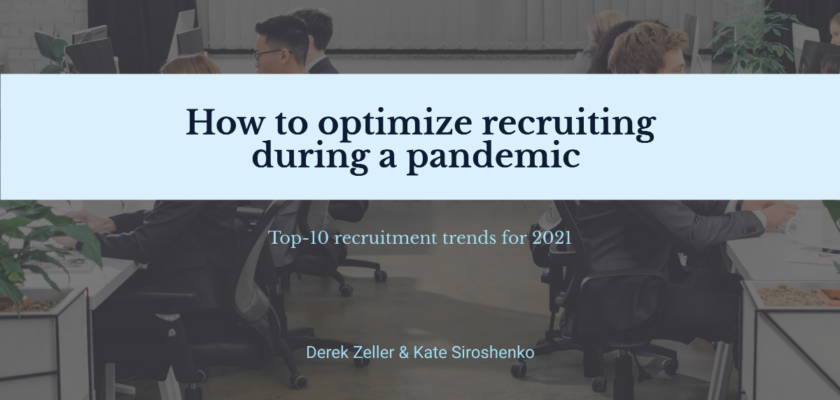2020 was an uneasy year for IT recruiting. Outsourcing business, remote R&D centres, Global IT companies all faced numerous staff reductions, losses, etc. The highest growth in layoffs was recorded in April. And at the same time there was a very low number of vacancies. However, slowly but confidently recruitment has started growing since May. The maximum amount of job openings was recorded in November.
At DNA325 we try to do recruiting analytics every quarter and predict what is to come. Our recruiting lead, Kate Siroshenko, shared her top-10 recruitment trends for 2021.
Digital recruiting isn’t near, it’s here
- Remote work and distributed teams
The year 2020 has greeted us with a pandemic, so remote format has become the “new normal way of work” for many organizations and teams. Employers are taking steps to keep their employees safe.
- Wider usage of online communication tools
Companies will continue conducting interviews online using video conference apps as a precaution against a pandemic.
- Rejecting traditional requirements
Accordingly, they will have more candidates and less bias caused by degrees, awards, and university titles. Since many of today’s technical specialists have no formal education, and more than 65% of developers claim to be self-taught, recruiters can open their candidate funnel if they are not restricted by traditional requirements related to educational grade.
- Artificial Intelligence
With artificial intelligence, the traditional hiring process will be enhanced by smart hiring techniques. Chatbots based on Artificial Intelligence will seem to be a common occurrence, as these companies will use them at the first stages of candidate selection, before conducting personal interviews. Besides that, AI-enabled human resources analytics will be widespread.
- Processing information with the help of NLP
Sorting through hundreds of resumes remains one of the most time-consuming recruitment tasks. With NLP, recruiters can quickly identify the best candidates. NLP can also be combined with voice recognition technology to speed up the review and analysis of interviews. It can also improve chatbots by providing candidates with personalized responses.
- Corporate culture of the company
Corporate culture will develop rapidly. According to a survey by Robert Half International, 1,000 employees and more than 5,500 senior managers, 35% of employees would turn down a job offer if the corporate culture didn’t fit their expectations, even if the role was a perfect fit. More than 90% of managers surveyed also believe that a candidate’s fit with their company culture is just as important as skills and experience.
With that in mind, recruiters need to find the perfect balance so that company culture fits both baby boomers and Gen X, millennials and Gen Z
- Social Networks
Interest towards social recruitment grows each day, and recruiters can maximize its potential by creating presence and becoming available on Facebook, Twitter and Instagram, besides LinkedIn, of course.
- Internal Candidate Recruitment
Through internal recruitment, organizations can close vacancies faster because there will be fewer factors to pay attention to.
- Variety and employee engagement
Creating a team that consists of people with different levels of talent, ability, gender, religion and age, as well as other distinguishing factors. Establishing diversity in the workplace has proven to be beneficial. Benefits include different perspectives on a particular subject or project, increasing the collective creativity potential, faster problem solving and better employee involvement.
- Employee Retention
Developing the best possible conditions for employee retention is efficient, as staff turnover affects the company’s budget. Creating a strong employer brand is also going to be useful. Having a good company reputation increases your chances of finding candidates who are looking for long-term employment.
We are only humans after all
As our guest expert Derek Zeller says, these are, at least in his lifetime, the strangest time to recruit for people. People that are looking are more susceptible to being mistreated by companies as so many of them seem to think that there are so many applicants out there they can just sit back and go through resume after resume. People are taking unemployment checks to the bank to pay rent/mortgages and possibly feed their kids. So, what can you do about it? That is the real question that he is going to try and answer.
Recruiters should never think they are working for a “customer” unless you are a staffing agency. They really are a customer who is paying you. In-house recruiters should demand a stake in the game when recruiting for the company. It is eventually your name out there, and unless you think you have a job for life, you should start thinking like that. Maya Angelou was quoted as saying, “I’ve learned that people will forget what you said, people will forget what you did, but people will never forget how you made them feel” NO more valid words have been spoken when it comes to recruiting business. The reputation of a company really falls on the shoulders of recruiting, in my opinion. We are the initial face of the company we are representing.
Recruiters within recruiting agencies are people too. Yeah, he means that, and if you are in one, no matter if it is your first time or a seasoned veteran, think about the commodity you are working with. It’s not just analytical recruiting or pipelining candidates; it is about being human and knowing that the person on the other side of the phone may be going through things that they would not; being professional is never wrong. As we begin ramping up hiring in many sectors, agencies will be called upon to really get the process going. Although things may be slow, Derek’s advice is to start talking to those folks out of work. Not every day but a call or email asking them how they are doing and that once you have something that fits their skill set, you will be there for them. People will remember you, and once placed, they are going to chat and get you referrals.
Partner with your hiring managers by using the summation of the moment. You don’t have to send articles as they will rarely read them but send them a quick note detailing the week, what you see in the market, and guide them that good people will be picked up by a hungry company quickly. They need to make choices rapidly and efficiently, or they just miss out on the candidate or candidates they really want. I have often said to managers, “Do you remember when you were looking for a job? Was it fun?” The look I get is usually one of reflection, and they often nod their heads in agreement that this is not, indeed, a fun process to have to go through. In fact, for many, it’s a humiliating and dehumanizing one, and we seem to want to allow that process to continue.
Demand more from your managers and if you need to go to the highest levels to get what is required. Explain your process and WHY it matters to get feedback as soon as the interview is over, not five days later, whether they like them or not. Twenty-four hours after an interview or less is what should be the norm in the industry. These are challenging times for people right now, even within our own industry.
The same can be said for candidate feedback. Look, no one likes to give bad news. Still, as a Doctor goes out to speak with loved ones, the surgery did not go the way they wanted. They have passed, we too, have to say sorry we are going with other candidates at this time. Make it personal though, machine ATS messages are both artificial and come off that you did not care for their time as much as yours. If someone, like now, takes hours to interview with you and your team, they deserve a phone call from you, not an automated thanks but no thanks.
Lastly, remember, and please never forget that we are recruiting human beings, not machines without feelings. People have long memories, and as Ms. Angelou said, they will Remember how you made them feel, and someday, maybe, just maybe, you will be sitting in front of them looking for a job. What do you think they would do based on your past behavior?



